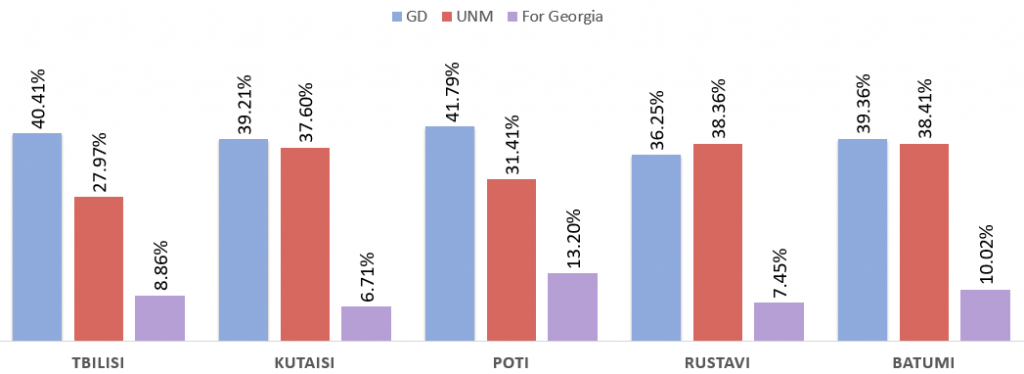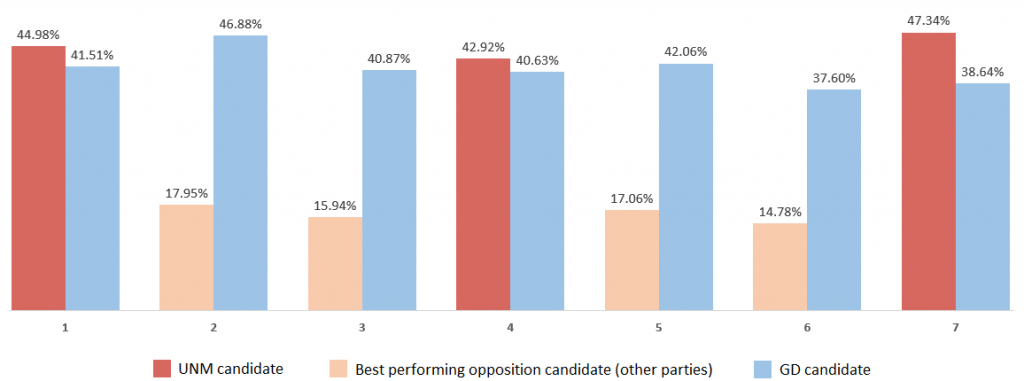2021 Municipal Elections: Outcomes, Winners, Trends
The outcomes of the October 2 municipal vote in Georgia were not what many had thought: against the expectations that it would struggle to climb over the 43% proportional vote threshold introduced by the EU-brokered deal, the ruling Georgian Dream has sailed past it, ringing in 46.74%.
Yet, the United National Movement (UNM), its main rival, still managed to pull an upset, particularly in larger cities and municipalities, where it forced runoffs. Those who hoped to overcome the polarization lament the underperformance of smaller parties.
Results
According to the preliminary results published by the Central Election Commission (CEC), GD received 46.74% in the nationwide proportional vote, followed by the UNM with 30,68%, and For Georgia party led by ex-Prime Minister Giorgi Gakharia with 7.79%. The rest of the political parties finished up under 3%.
The ruling party got bruised in major cities and municipalities: in the capital, Tbilisi, it garnered 40.41% of the proportional vote, while clocking under 40% in three out of four remaining self-governing cities: Rustavi – 36.25%, Kutaisi – 39.21%, Batumi 39.36%, Poti 41.79%.

In the mayoral races, GD failed to win Tbilisi outright for its most popular leader – incumbent Mayor Kakha Kaladze. He still performed better than the party, receiving 45,06% of votes, but was followed by UNM’s Nika Melia with 33,95%. Ex-PM Gakharia came third, clearly hitting Kaladze’s prospects by bagging 9,35%.
Surprise performance for Anna Dolidze, who founded the For People party after her positive results as independent in the 2020 general elections. With meager finances and little TV screen time, she took 4.59% of the votes. Relatively better endowed Ana Bibilashvili from Lelo for Georgia ended with 2.53%. The ruling party will face runoffs in 19 other districts, including the remaining four self-governing cities.
GD won the vast majority of majoritarian Sakrebulo (municipal assembly) races, where candidates needed to take at least 40% votes to win in the first round. In Zugdidi (Samegrelo-Zemo Svaneti region) the UNM has won enough Sakrebulo seats to form the majority alone. In at least three other cities/municipalities – Senaki, Rustavi, and Batumi – the parties will have to form coalitions. In Tsalenjikha GD can still have the majority if it wins all five run-offs.
Table: numbers and shares of votes won by key parties in the proportional race of three different elections.
| 2017 Municipals | 2020 Parliamentary | 2021 Municipals | |
|---|---|---|---|
| Voter Turnout | 1,570,563 (45.65%) | 1,992,891 (56.11%) | 1,815,776 (51.92%) |
| Georgian Dream | 838,154 (55.81%) | 928,004 (48.22%) | 824,314 (46.74%) |
| Gakharia/For Georgia* | – | – | 137,416 (7.79 %) |
| UNM/Bloc | 256,547 (17.08%) | 523,127 (27.28%) | 541,063 (30.68%) |
| European Georgia | 156,232 (10.4%) | 72,986 (3.79%) | 29,280 (1.66%) |
| Elene Khoshtaria/Droa!** | – | – | 10,823 (0.61 %) |
| Lelo for Georgia | – | 60,712 (3.15%) | 47,838 (2.71%) |
| Giorgi Vashadze/ Strategy Agmashenebeli/ Third Force | 18,426 (1.23%) | 60,671 (3.15%) | 23,629 (1.34%) |
| Alliance of Patriots of Georgia | 98,530 (6.56%) | 60,480 (3.14%) | 25,668 (1.46%) |
| NPC Girchi | – | 55,598 (2.89%) | 16,695 (0.95%) |
| Girchi – More Freedom*** | – | – | 25,446 (1.44 %) |
| Labor Party | 49,130 (3.27%) | 19,314 (1.00%) | 24,293 (1.38%) |
| Elisashvili/Citizens | – | 25,508 (1.33%) | 14,671 (0.83%) |
**Elene Khoshtaria formed Droa! party after leaving European Georgia late in 2020
*** Girchi – More Freedom emerged after Zura Japaridze and part of other members split from NPC Girchi late in 2020
Winners and Losers
The October 2 elections were perceived as the general test of legitimacy for the Georgian Dream government, especially since it was inscribed in the April 19 EU-brokered agreement (even though the GD explicitly abandoned it).
This expectation for major change led the GD to mobilize its own resources while the main opposition force UNM whipped up its voters for the “referendum.” The turnout was considerably higher compared to the previous (2017) municipal elections, but still below that of the 2020 parliamentary polls.
Despite the anticipated post-election turbulence, there is little. The results, paradoxically, give something to be happy about to (almost) everybody.
The Georgian Dream, while doing better than expected, performed still worse than in any previous elections. both in terms of valid votes and percent shares. It bled close to 100 thousand votes compared to the 2020 parliamentary vote, while UNM has gained some 18 thousand since 2020 and almost doubled the number of its supporters since 2017. The ruling party blamed Gakharia for this underperformance.
European Georgia, a party formed by former UNM members in 2017, which underwent the leadership crisis and is in the midst of massive rebranding, has lost ground dramatically, slipping from 10,4% in 2017 municipals to 1,66% this year. Other parties formed by once-UNM members (Girchi, Strategy Agmashenebeli/Third Force) also suffered losses as the voters either stayed home or went for the “real thing”, reverting to UNM. Lelo for Georgia led by Mamuka Khazaradze and Badri Japaridze, two businessmen-turned-MPs, is another newer party that lost ground, but less than competitors.
As GD drew heavily on nationalism, xenophobia, and skepticism to the west, it pulled the rug from under the feet of the conservative forces. The Alliance of Patriots of Georgia, once a potent nativist outfit, shrank from 6,56% in 2017 locals to 1,46%, while the ERI party founded by businessman Levan Vasadze has polled near zero.
Key Trends
Stressing the return of polarized atmosphere, experts point to the role played by the arrival and arrest of ex-President Mikheil Saakashvili in mobilizing support for two major parties. Urban voters contributed most to overall opposition gains despite what pundits and observers prudently call an “unequal election environment:” observers have repeatedly pointed to misuse of administrative resources by the ruling party and “loss of the division line” between the ruling party and public administration, coupled with the alleged continuation of the malign practices such as vote-buying or pressure or intimidation of voters or opposition candidates.
Another prominent trend was a decisively better performance of UNM candidates versus UNM-endorsed contenders from smaller parties. This may be attributed to a heightened polarization, but also to voter confusion with too many numbers on ballot papers.

According to the data analysis performed by Georgian expert David Sichinava, GD and UNM most likely kept their voters from 2020, with UNM funneling those who supported EG and Strategy Agmashenebeli last year. For Georgia party presumably benefitted from former GD voters, while also nibbling some 2020 voters from other, smaller parties.
Despite the opposition gains, Georgia’s politics remains, by and large, a bipartisan game. The two arch-enemies squash the middle ground in their combat, both consciously and as collateral damage. The ruling party is generally expected to win most runoffs too. Still, in a very small portion of municipal councils, the election outcomes create a chance to test the coalition rule. In several cases, much will depend on those who voted for Gakharia’s party, even though he refused to endorse anyone. For Georgia is also the crucial kingmaker in Sakrebulos of several municipalities, so the deputies will have to either return into GD’s fold or siding more decisively with the opposition (including the UNM).
Iago Kachkachishvili, Professor of Sociology, fears that small parties will struggle to regain their force among the “two political monsters,” but remains optimistic that Georgian voters will learn to accept the coalition rule “slowly, but steadily”.
Parties React
Despite concerns over the unequal vote, key opposition parties appear to be accepting the outcomes and even find seeds for optimism in what happened. Importantly, the preliminary results coincided with more credible exit polls and parallel vote tabulation data published by ISFED, the key election watchdog.
The UNM, happy for the success in larger cities, is now bracing for runoffs. Parties such as Lelo or European Georgia, too, though losing support, chose to peddle the line that “inevitable change is afoot”.
Anna Dolidze has reasons to be happy about her performance in Tbilisi mayoral race. Besides, while her freshly-founded For People did not have candidates in many municipalities, the party still got single mandates in Sakrebulos of Tbilisi (2,57%) and Kazbegi (3,17%). “Look at the resources spent by other parties and then at their results. Our party has spent in these elections, in fact, an amount of a single [ad] banner – GEL 40,000 [USD 13,000],” Dolidze said, pushing an optimistic tagline that For People is a party of “love, faith, and future.”
Some parties such as NPC Girchi and For Georgia are in a more morose mood. They pointed to the developments on elections eve (a euphemism for Mikheil Saakashvili’s return and his subsequent incarceration) as factors influencing the voter behavior in their disfavor. Zurab Japaridze’s Girchi – More Freedom and Gakharia’s For Georgia also actively blame pre-election violations and pressure on their supporters. Gakharia is not too unhappy with his showing though.
In the meantime, Mayor Kaladze opted to show humility for failing to win in the first round and apologized for “underdelivering”. Still, the ruling party is in a celebratory mood at winning what they now agree to call the “referendum” (a word they refused to use during the campaign). However, Saakashvili’s sudden return and imprisonment have still not fully played out electorally, while Gakharia’s refusal to endorse GD makes it doubtful, whether his men would ally with GD in municipalities. With runoffs looming, the opening salvo of the Georgian Dream – in form of the Prime Minister’s letter heralds – the continuation of the divisive campaign from the ruling party, centered around Saakashvili and Gakharia’s personalities.
Also Read: